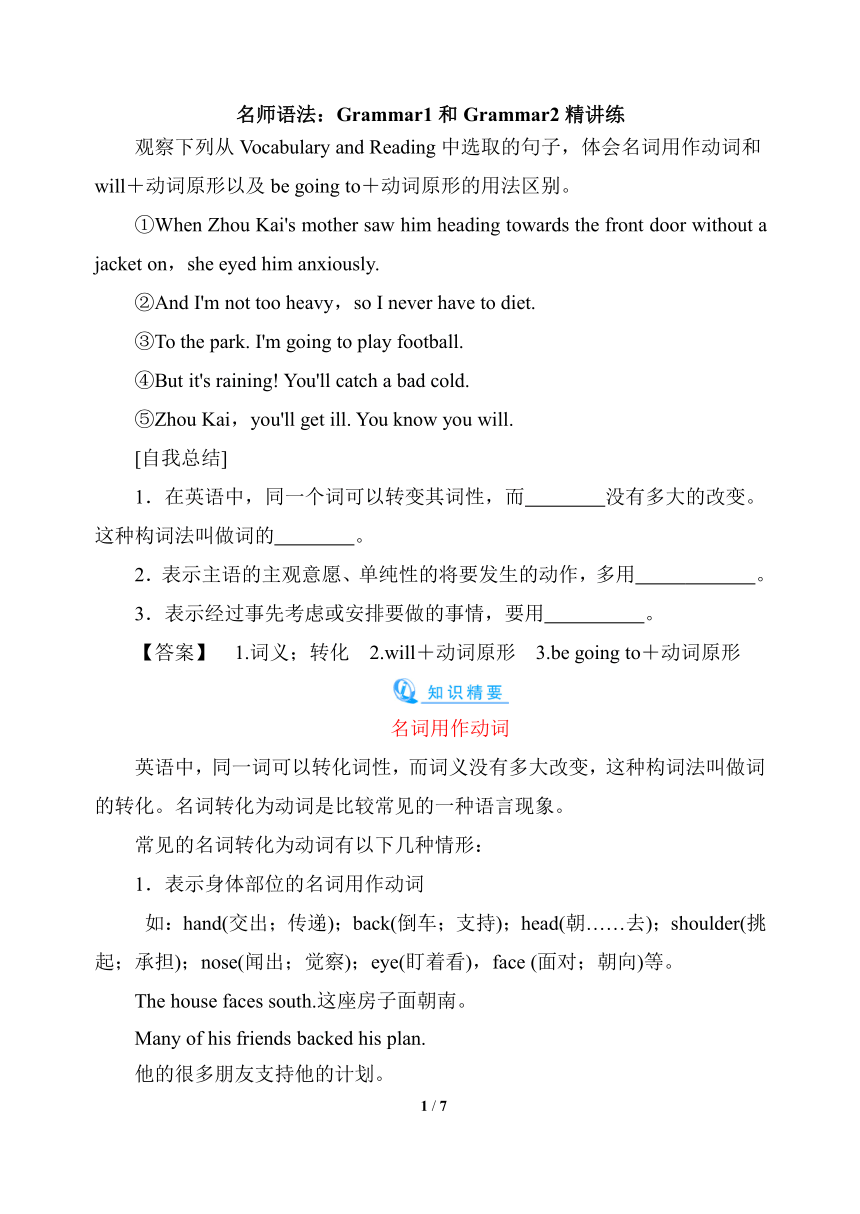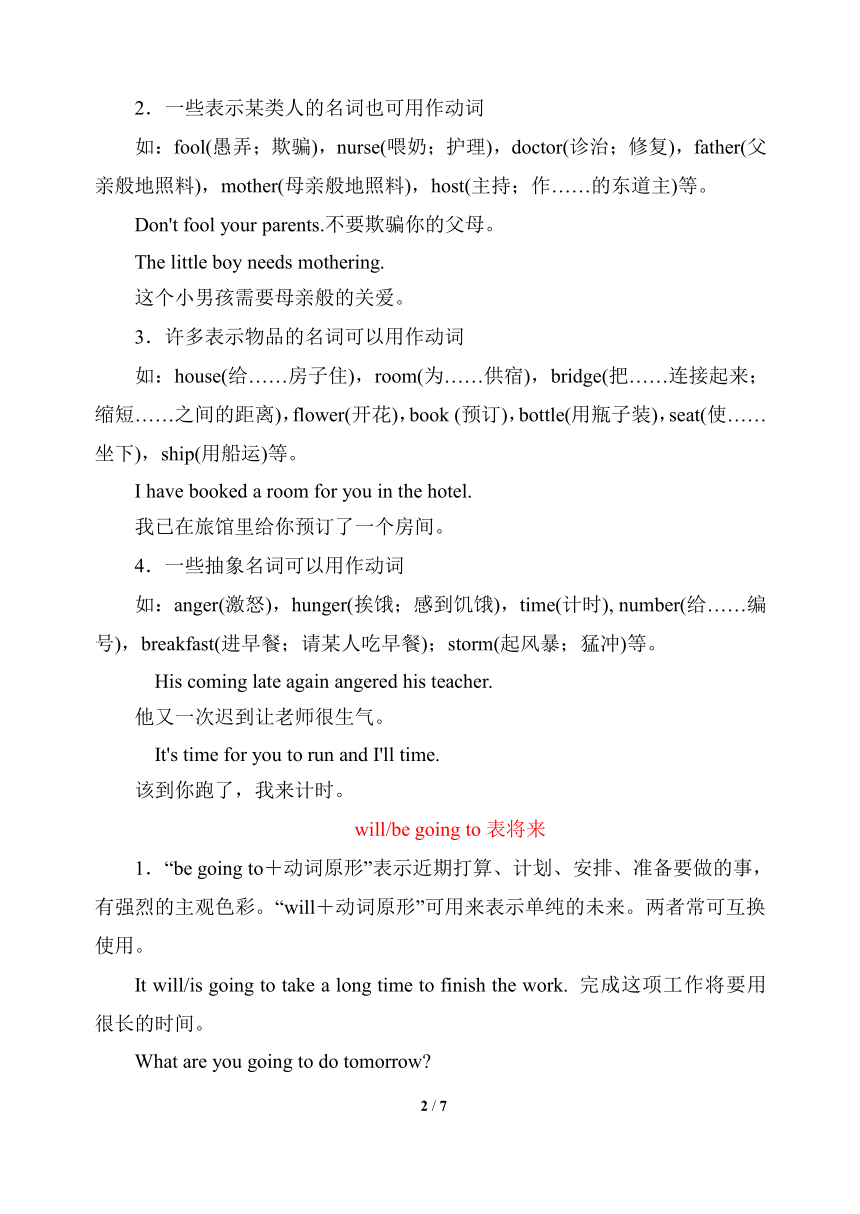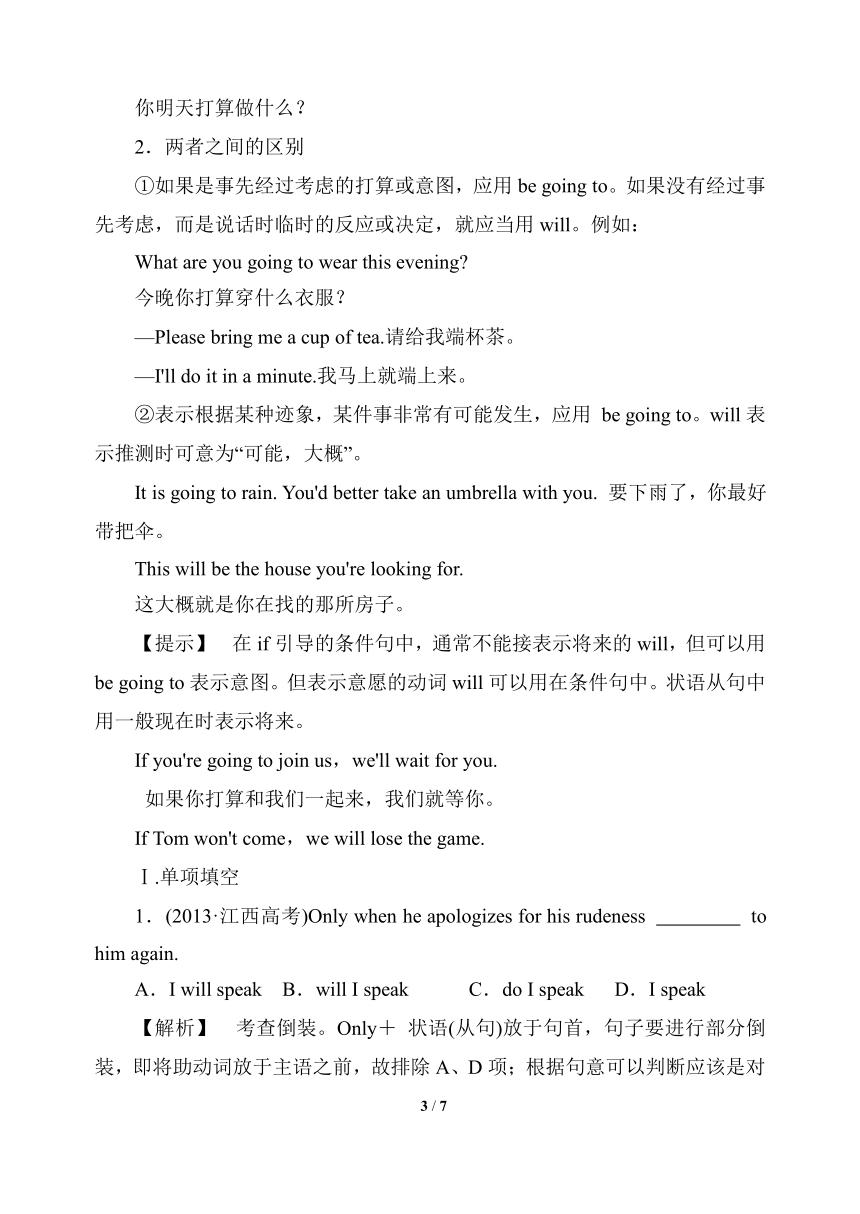外研版必修2Module 1 Our Body and Healthy Habits Grammar1&2精讲练学案(含答案)
文档属性
| 名称 | 外研版必修2Module 1 Our Body and Healthy Habits Grammar1&2精讲练学案(含答案) |

|
|
| 格式 | doc | ||
| 文件大小 | 76.0KB | ||
| 资源类型 | 教案 | ||
| 版本资源 | 外研版 | ||
| 科目 | 英语 | ||
| 更新时间 | 2023-02-13 15:58:49 | ||
图片预览



文档简介
名师语法:Grammar1和Grammar2精讲练
观察下列从Vocabulary and Reading中选取的句子,体会名词用作动词和will+动词原形以及be going to+动词原形的用法区别。
①When Zhou Kai's mother saw him heading towards the front door without a jacket on,she eyed him anxiously.
②And I'm not too heavy,so I never have to diet.
③To the park. I'm going to play football.
④But it's raining! You'll catch a bad cold.
⑤Zhou Kai,you'll get ill. You know you will.
[自我总结]
1.在英语中,同一个词可以转变其词性,而 没有多大的改变。这种构词法叫做词的 。
2.表示主语的主观意愿、单纯性的将要发生的动作,多用 。
3.表示经过事先考虑或安排要做的事情,要用 。
【答案】 1.词义;转化 2.will+动词原形 3.be going to+动词原形
名词用作动词
英语中,同一词可以转化词性,而词义没有多大改变,这种构词法叫做词的转化。名词转化为动词是比较常见的一种语言现象。
常见的名词转化为动词有以下几种情形:
1.表示身体部位的名词用作动词
如:hand(交出;传递);back(倒车;支持);head(朝……去);shoulder(挑起;承担);nose(闻出;觉察);eye(盯着看),face (面对;朝向)等。
The house faces south.这座房子面朝南。
Many of his friends backed his plan.
他的很多朋友支持他的计划。
2.一些表示某类人的名词也可用作动词
如:fool(愚弄;欺骗),nurse(喂奶;护理),doctor(诊治;修复),father(父亲般地照料),mother(母亲般地照料),host(主持;作……的东道主)等。
Don't fool your parents.不要欺骗你的父母。
The little boy needs mothering.
这个小男孩需要母亲般的关爱。
3.许多表示物品的名词可以用作动词
如:house(给……房子住),room(为……供宿),bridge(把……连接起来;缩短……之间的距离),flower(开花),book (预订),bottle(用瓶子装),seat(使……坐下),ship(用船运)等。
I have booked a room for you in the hotel.
我已在旅馆里给你预订了一个房间。
4.一些抽象名词可以用作动词
如:anger(激怒),hunger(挨饿;感到饥饿),time(计时), number(给……编号),breakfast(进早餐;请某人吃早餐);storm(起风暴;猛冲)等。
His coming late again angered his teacher.
他又一次迟到让老师很生气。
It's time for you to run and I'll time.
该到你跑了,我来计时。
will/be going to表将来
1.“be going to+动词原形”表示近期打算、计划、安排、准备要做的事,有强烈的主观色彩。“will+动词原形”可用来表示单纯的未来。两者常可互换使用。
It will/is going to take a long time to finish the work. 完成这项工作将要用很长的时间。
What are you going to do tomorrow
你明天打算做什么?
2.两者之间的区别
①如果是事先经过考虑的打算或意图,应用be going to。如果没有经过事先考虑,而是说话时临时的反应或决定,就应当用will。例如:
What are you going to wear this evening
今晚你打算穿什么衣服?
—Please bring me a cup of tea.请给我端杯茶。
—I'll do it in a minute.我马上就端上来。
②表示根据某种迹象,某件事非常有可能发生,应用 be going to。will表示推测时可意为“可能,大概”。
It is going to rain. You'd better take an umbrella with you. 要下雨了,你最好带把伞。
This will be the house you're looking for.
这大概就是你在找的那所房子。
【提示】 在if引导的条件句中,通常不能接表示将来的will,但可以用be going to表示意图。但表示意愿的动词will可以用在条件句中。状语从句中用一般现在时表示将来。
If you're going to join us,we'll wait for you.
如果你打算和我们一起来,我们就等你。
If Tom won't come,we will lose the game.
Ⅰ.单项填空
1.(2013·江西高考)Only when he apologizes for his rudeness to him again.
A.I will speak B.will I speak C.do I speak D.I speak
【解析】 考查倒装。Only+ 状语(从句)放于句首,句子要进行部分倒装,即将助动词放于主语之前,故排除A、D项;根据句意可以判断应该是对于将来事情的叙述,故使用将来时态,因此答案选B。
【答案】 B
2.(2013·北京高考)—Do you think Mom and Dad
late
—No. Swiss Air is usually on time.
A.were B.will be C.would be D.have been
【解析】 考查动词时态。根据句意:你认为父母会迟到吗?可知答案为一般将来时态,故选B。
【答案】 B
3.—Ann is in hospital.
—Yes,I know. I her tomorrow.
A.visit B.used to visit C.will visit D.am going to visit
【解析】 由“Yes,I know.”可知应选D项,be going to表示“打算……”,更强调计划性。
【答案】 D
4.—The ceiling of this room doesn't look very safe,does it
—No,it looks as if it down.
A.will fall B.is going to fall C.fell D.has fallen
【解析】 由上句可推知天花板似乎已经出了问题,故用be going to 表示有迹象表明要发生某事;“will+动词原形”更侧重于主观推测。
【答案】 B
5.(2011·四川高考)—How was your recent trip to Sichuan
—I've never had one before.
A.a pleasant B.a more pleasant
C.a most pleasant D.the most pleasant
【解析】 考查比较级的否定。句意:——你最近的四川之旅怎么样?——我从来没有比这次更快乐的旅途了。言外之意这次是我最快乐的。not,never等否定词与比较级连用表达最高级意义。故选B项。
【答案】 B
6.The government has built new houses to
the homeless people.
A.save B.house C.praise D.seat
【解析】 句意:政府建了新房子给无家可归的人提供住处。house 在本句中是动词,意思是“为……提供住处”。
【答案】 B
7.—Cathy,the door bell is ringing! I'm doing the dishes.
—Mum,I see who it is.
A.would B.will
C.am about to D.am going to
【解析】 考查一般将来时。would表示过去将来,will表示一般将来,且没有计划性,而是临时的决定。be about to do sth.表示说话间即刻要发生的事,be going to do sth.表示按照计划或安排将要做某事。根据句意可知B项正确。
【答案】 B
8.—Why did you buy a new set of suit
—I have an interview next week.
A.am about to B.maybe C.will D.am going to
【解析】 be about to 表示说话间就要发生的事;“will+动词原形”无计划性;be going to 表示按计划将要做某事。下周参加面试是计划中的事情,故选D。
【答案】 D
9.—When again
—When she ,I'll let you know.
A.she comes;come
B.will she come;will come
C.she comes;will come
D.will she come;comes
【解析】 答语中的when引导的是一个时间状语从句,故用一般现在时表将来;根据句意可知第一个空应该用一般将来时。
【答案】 D
10.Many kinds of fruit are in factories and sold in supermarkets in big cities.
A.bottle B.cook C.bottled D.bought
【解析】 考查名词用作动词的用法。bottle用作动词意为“用瓶子装”,根据句意此处用被动语态。
【答案】 C
Ⅱ.用括号内所给动词的正确形式填空
1.Don't go out!It (rain).
2.—Have you posted my letter
—Sorry,I (post) it soon.
3.Each time he comes to Beijing,he (visit) the Great Wall.
4.She has bought some cloth; she (make) herself a dress.
5.—Where is the telephone book
—I (go) and get it for you.
6.—Hurry up!We are all waiting for you.
—I (come).
7.After he (come),please tell me at once.
8.When the famous star came in,all people (eye) her.
【答案】 1.is going to rain/is raining 2.will post
3.will visit 4.is going to make 5.will go
6.am coming 7.comes 8.eyed
PAGE
5 / 7
观察下列从Vocabulary and Reading中选取的句子,体会名词用作动词和will+动词原形以及be going to+动词原形的用法区别。
①When Zhou Kai's mother saw him heading towards the front door without a jacket on,she eyed him anxiously.
②And I'm not too heavy,so I never have to diet.
③To the park. I'm going to play football.
④But it's raining! You'll catch a bad cold.
⑤Zhou Kai,you'll get ill. You know you will.
[自我总结]
1.在英语中,同一个词可以转变其词性,而 没有多大的改变。这种构词法叫做词的 。
2.表示主语的主观意愿、单纯性的将要发生的动作,多用 。
3.表示经过事先考虑或安排要做的事情,要用 。
【答案】 1.词义;转化 2.will+动词原形 3.be going to+动词原形
名词用作动词
英语中,同一词可以转化词性,而词义没有多大改变,这种构词法叫做词的转化。名词转化为动词是比较常见的一种语言现象。
常见的名词转化为动词有以下几种情形:
1.表示身体部位的名词用作动词
如:hand(交出;传递);back(倒车;支持);head(朝……去);shoulder(挑起;承担);nose(闻出;觉察);eye(盯着看),face (面对;朝向)等。
The house faces south.这座房子面朝南。
Many of his friends backed his plan.
他的很多朋友支持他的计划。
2.一些表示某类人的名词也可用作动词
如:fool(愚弄;欺骗),nurse(喂奶;护理),doctor(诊治;修复),father(父亲般地照料),mother(母亲般地照料),host(主持;作……的东道主)等。
Don't fool your parents.不要欺骗你的父母。
The little boy needs mothering.
这个小男孩需要母亲般的关爱。
3.许多表示物品的名词可以用作动词
如:house(给……房子住),room(为……供宿),bridge(把……连接起来;缩短……之间的距离),flower(开花),book (预订),bottle(用瓶子装),seat(使……坐下),ship(用船运)等。
I have booked a room for you in the hotel.
我已在旅馆里给你预订了一个房间。
4.一些抽象名词可以用作动词
如:anger(激怒),hunger(挨饿;感到饥饿),time(计时), number(给……编号),breakfast(进早餐;请某人吃早餐);storm(起风暴;猛冲)等。
His coming late again angered his teacher.
他又一次迟到让老师很生气。
It's time for you to run and I'll time.
该到你跑了,我来计时。
will/be going to表将来
1.“be going to+动词原形”表示近期打算、计划、安排、准备要做的事,有强烈的主观色彩。“will+动词原形”可用来表示单纯的未来。两者常可互换使用。
It will/is going to take a long time to finish the work. 完成这项工作将要用很长的时间。
What are you going to do tomorrow
你明天打算做什么?
2.两者之间的区别
①如果是事先经过考虑的打算或意图,应用be going to。如果没有经过事先考虑,而是说话时临时的反应或决定,就应当用will。例如:
What are you going to wear this evening
今晚你打算穿什么衣服?
—Please bring me a cup of tea.请给我端杯茶。
—I'll do it in a minute.我马上就端上来。
②表示根据某种迹象,某件事非常有可能发生,应用 be going to。will表示推测时可意为“可能,大概”。
It is going to rain. You'd better take an umbrella with you. 要下雨了,你最好带把伞。
This will be the house you're looking for.
这大概就是你在找的那所房子。
【提示】 在if引导的条件句中,通常不能接表示将来的will,但可以用be going to表示意图。但表示意愿的动词will可以用在条件句中。状语从句中用一般现在时表示将来。
If you're going to join us,we'll wait for you.
如果你打算和我们一起来,我们就等你。
If Tom won't come,we will lose the game.
Ⅰ.单项填空
1.(2013·江西高考)Only when he apologizes for his rudeness to him again.
A.I will speak B.will I speak C.do I speak D.I speak
【解析】 考查倒装。Only+ 状语(从句)放于句首,句子要进行部分倒装,即将助动词放于主语之前,故排除A、D项;根据句意可以判断应该是对于将来事情的叙述,故使用将来时态,因此答案选B。
【答案】 B
2.(2013·北京高考)—Do you think Mom and Dad
late
—No. Swiss Air is usually on time.
A.were B.will be C.would be D.have been
【解析】 考查动词时态。根据句意:你认为父母会迟到吗?可知答案为一般将来时态,故选B。
【答案】 B
3.—Ann is in hospital.
—Yes,I know. I her tomorrow.
A.visit B.used to visit C.will visit D.am going to visit
【解析】 由“Yes,I know.”可知应选D项,be going to表示“打算……”,更强调计划性。
【答案】 D
4.—The ceiling of this room doesn't look very safe,does it
—No,it looks as if it down.
A.will fall B.is going to fall C.fell D.has fallen
【解析】 由上句可推知天花板似乎已经出了问题,故用be going to 表示有迹象表明要发生某事;“will+动词原形”更侧重于主观推测。
【答案】 B
5.(2011·四川高考)—How was your recent trip to Sichuan
—I've never had one before.
A.a pleasant B.a more pleasant
C.a most pleasant D.the most pleasant
【解析】 考查比较级的否定。句意:——你最近的四川之旅怎么样?——我从来没有比这次更快乐的旅途了。言外之意这次是我最快乐的。not,never等否定词与比较级连用表达最高级意义。故选B项。
【答案】 B
6.The government has built new houses to
the homeless people.
A.save B.house C.praise D.seat
【解析】 句意:政府建了新房子给无家可归的人提供住处。house 在本句中是动词,意思是“为……提供住处”。
【答案】 B
7.—Cathy,the door bell is ringing! I'm doing the dishes.
—Mum,I see who it is.
A.would B.will
C.am about to D.am going to
【解析】 考查一般将来时。would表示过去将来,will表示一般将来,且没有计划性,而是临时的决定。be about to do sth.表示说话间即刻要发生的事,be going to do sth.表示按照计划或安排将要做某事。根据句意可知B项正确。
【答案】 B
8.—Why did you buy a new set of suit
—I have an interview next week.
A.am about to B.maybe C.will D.am going to
【解析】 be about to 表示说话间就要发生的事;“will+动词原形”无计划性;be going to 表示按计划将要做某事。下周参加面试是计划中的事情,故选D。
【答案】 D
9.—When again
—When she ,I'll let you know.
A.she comes;come
B.will she come;will come
C.she comes;will come
D.will she come;comes
【解析】 答语中的when引导的是一个时间状语从句,故用一般现在时表将来;根据句意可知第一个空应该用一般将来时。
【答案】 D
10.Many kinds of fruit are in factories and sold in supermarkets in big cities.
A.bottle B.cook C.bottled D.bought
【解析】 考查名词用作动词的用法。bottle用作动词意为“用瓶子装”,根据句意此处用被动语态。
【答案】 C
Ⅱ.用括号内所给动词的正确形式填空
1.Don't go out!It (rain).
2.—Have you posted my letter
—Sorry,I (post) it soon.
3.Each time he comes to Beijing,he (visit) the Great Wall.
4.She has bought some cloth; she (make) herself a dress.
5.—Where is the telephone book
—I (go) and get it for you.
6.—Hurry up!We are all waiting for you.
—I (come).
7.After he (come),please tell me at once.
8.When the famous star came in,all people (eye) her.
【答案】 1.is going to rain/is raining 2.will post
3.will visit 4.is going to make 5.will go
6.am coming 7.comes 8.eyed
PAGE
5 / 7
